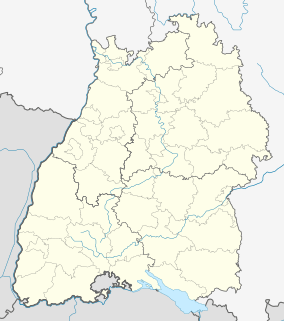Bad Schönborn Süd station
Bad Schönborn Süd station is the busier of two stations in the town of Bad Schönborn in the German state of Baden-Württemberg. The other is Bad Schönborn-Kronau station. It is located on the Rhine Valley Railway in the district of Bad Langenbrücken. It is classified by Deutsche Bahn (DB) as a category 4 station.[1] It has three platform and is located in the area of the Karlsruher Verkehrsverbund (Karlsruhe Transport Association, KVV), which manages regional rail services and sets fares. Since December 2003, it has been exclusively served by services on lines S3 and S4 of the Rhine-Neckar S-Bahn.
| Through station | ||||||||||||||||
| Location | Römerstr. 33, 76669 Bad Schönborn, Baden-Württemberg Germany | |||||||||||||||
| Coordinates | 49°12′00″N 8°38′31″E | |||||||||||||||
| Owned by | Deutsche Bahn | |||||||||||||||
| Operated by | DB Station&Service | |||||||||||||||
| Line(s) | Rhine Valley Railway (km 42.4) (KBS 701) | |||||||||||||||
| Tracks | 3 | |||||||||||||||
| Other information | ||||||||||||||||
| Station code | 340[1] | |||||||||||||||
| DS100 code | RBS[2] | |||||||||||||||
| IBNR | 8003533 | |||||||||||||||
| Category | 4[1] | |||||||||||||||
| Website | www.bahnhof.de | |||||||||||||||
| History | ||||||||||||||||
| Opened | 1843 | |||||||||||||||
| Previous names | Langenbrücken | |||||||||||||||
| Services | ||||||||||||||||
| ||||||||||||||||
| Location | ||||||||||||||||
 Bad Schönborn Süd Location in Baden-Württemberg  Bad Schönborn Süd Location in Germany  Bad Schönborn Süd Location in Europe | ||||||||||||||||
History
The Heidelberg–Bruchsal–Karlsruhe section of the Rhine Valley Railway was opened by the Grand Duchy of Baden State Railway on 10 April 1843, initially as 5 ft 3 in (1,600 mm) Irish gauge. Langenbrücken station was built at the same time in Langenbrücken. A few years later, the line was doubled.
Since the broad gauge was incompatible with the standard gauge used by its neighbours, Baden soon feared the loss of lucrative through traffic. Therefore, Baden converted its lines to standard gauge in 1854 in just four months.
As on 1 January 1971, as part of the local government reform in Baden-Württemberg, Mingolsheim and Langenbrücken were incorporated in the newly formed municipality of Bad Schönborn and the station was renamed Bad Schönborn Süd.
The platforms were made accessible for the disabled in 2003, following the integration of the Rhine Valley Railway from Mannheim to Karlsruhe in the Rhine-Neckar S-Bahn network. The S-Bahn was opened for services at the 2003/2004 timetable change on 14 December 2003 and the station has been integrated in the S-Bahn network since.
Infrastructure
Platforms
Bad Schönborn Süd station is one of a few stations on the Rhine Valley Railway between Heidelberg and Bruchsal that has three tracks with a “home” platform next to the station building (platform 1) and an island platform (platforms 2 and 3). Trains towards Heidelberg stop at platform 1 and trains towards Bruchsal/Karlsruhe stop at platform 2. Track 3 is just a siding or used for the overtaking of slower trains.
Rail services
Bad Schönborn Süd station is only served by S-Bahn services (as of 2014). The station is served hourly by services on S-Bahn lines S3 (Germersheim–Karlsruhe Hbf) and S4 (Germersheim–Bruchsal), resulting in a service every half-hour between Germersheim and Bruchsal.
| Service | Route | Frequency |
|---|---|---|
| S 3 | Germersheim – Speyer – Schifferstadt – Ludwigshafen (Rhein) – Mannheim – Heidelberg Hbf – Wiesloch-Walldorf – Bad Schönborn Süd – Bruchsal – Karlsruhe Hbf | Hourly |
| S 4 | Germersheim – Speyer – Schifferstadt – Ludwigshafen (Rhein) – Mannheim – Heidelberg Hbf – Wiesloch-Walldorf – Bad Schönborn Süd – Bruchsal | Hourly |
Notes
- "Stationspreisliste 2020" [Station price list 2020] (PDF) (in German). DB Station&Service. 4 November 2019. Retrieved 15 November 2019.
- Eisenbahnatlas Deutschland (German railway atlas) (2009/2010 ed.). Schweers + Wall. 2009. ISBN 978-3-89494-139-0.
- "ART-werk in Kunstbahnhof" (in German). Retrieved 16 March 2016.
- "farbe und bekennen. Förderkreis für Kunst und Kirche e.V." (in German). Retrieved 16 March 2016.
References
| Wikimedia Commons has media related to Bahnhof Bad Schönborn Süd. |
- Albert Fuchs (1927). Kronau (Kislawer Ampts) Kleiner Beitrag zur Heimatgeschichte (in German). Bruchsal: Verlag Oskar Katz. pp. 168–170. (reprint Bad Schönborn 1974)